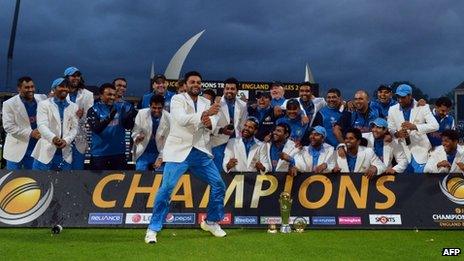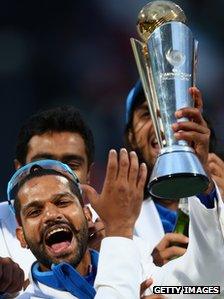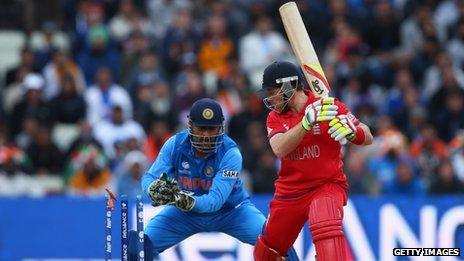Champions Trophy win: India show why they are top team
- Published

India won the Champions Trophy final beating England in a dramatic match
Sometimes, in team sport, the past can sit heavily on the present.
The team that won India's second World Cup in 2011, external contained Sachin Tendulkar: the first player to make a double century, external in 50-over cricket and probably the finest all-round batsman the game has seen.
Opening with him was Virender Sehwag, who went on to break Tendulkar's record in December 2011, scoring 219 against West Indies.
The player of the tournament was Yuvraj Singh, the top scorer in the final was Gautam Gambhir. Also in that team were two bowlers with over 250 wickets: Zaheer Khan and Harbhajan Singh.
Yet, two years later, none of them were in the team for the Champions Trophy victory - and, incredibly, none of them were missed.
Continuity was provided by the captain, Mahendra Singh Dhoni, and two stalwarts in their mid-20s - Virat Kohli and Suresh Raina.
For the first time in a major one-day tournament abroad, India began as favourites, played like winners and remained unbeaten.
Dhoni alone is in his 30s, and he is only 31, in a team with an average age of 26.
The transition is complete - the team for the 2015 World Cup is here.
For Sehwag read Shikhar Dhawan, for Harbhajan read Ashwin, for Munaf Patel read Umesh Yadav, for Yuvraj Singh read Ravindra Jadeja.
Like for like, for those who prefer it that way - with the added bonus that some of those sidelined are young enough to fight their way back into the squad.
Long before they won, India were already the number one team in the world. At the Champions Trophy, they showed why.
The captain's faith
Player of the tournament Dhawan's crucial role at the top, with two centuries and two-century partnerships with the newly promoted Rohit Sharma, meant that the middle order was barely tested.
Much of the credit should go to Dhoni who put together that combination, and then backed his men.

Man of the Tournament Shikhar Dhawan played a crucial role in India's win
The players responded to the captain's faith rather than cricketing logic.
In the 2007 Twenty20 win, Dhoni had entrusted the final over of the match to a greenhorn, Joginder Sharma, and that move paid off.
This time, he gave the ball to Ishant Sharma when the cry was for the spinner, Suresh Raina.
And when Ishant sent down two wides and was hit for six, it seemed Dhoni had thrown the match away on a whim.
Yet, two wickets in two balls - the danger men Eoin Morgan and Ravi Bopara - brought India back into the game and guided the English fingers towards the panic button.
Dhoni showed once again that it was better to be a lucky captain than a tactical one.
Only someone with his immense self-confidence and disdain for cricketing logic would have persisted with Sharma.
It worked - and that ultimately has to be the justification for all moves on a field of sport.
'Young legs'
The team also had young legs - this was one of the finest fielding sides India have sent abroad.
Raina, Kohli and Jadeja are superb all-round fielders, as effective close-in as anticipating, picking up and throwing from the outfield.
And here too, Dhoni, ever the practical man, played a role, fielding Ashwin at slip where he took two significant catches in his bucket hands - those of Chris Gayle in an early game and Alastair Cook in the final where he finished with three catches.
Raina's three at slip in the semi-final against Sri Lanka were in the class of India's best in that position, Mohammad Azharuddin and Rahul Dravid.

Much of the credit for India's win should go to captain Mahendra Singh Dhoni
The young legs also meant that another weakness - running between the wickets - was overcome. Singles were seldom missed, and chances to convert these into twos were taken with confidence.
Only one of the traditional weaknesses remained - the bowling in the end overs. Dhoni was happy to use Ashwin rather than some of his fast men. The assault on Ishant Sharma by Darren Sammy of the West Indies was one of the highlights of the tournament.
New heroes have emerged, new hopes have been given wing.
Dhawan and Jadeja, both of the twirling moustache and abundant confidence, have emerged post-World Cup, and must now go into the next one as the potential stars.
Kohli has been around so long that one tends to forget he is only 24. There is an amazingly mature head on those young shoulders.
South Africa and England may not have been fielding their best teams owing to injury to players, Australia may be in transition, Pakistan in some disarray - but India can only play the team that turns up.
The message for the winners is clear: the transition has been successful. Dhoni can take credit for that, and so too can coach Duncan Fletcher - even if they were not particularly keen on taking the responsibility when India were doing badly in series following the World Cup.
How much will this affect the intensity of the investigations into spot-fixing and conflict of interest charges against the big noises of Indian cricket? Will everything be swept under the carpet now?
In the euphoria of a tournament victory, we cannot afford to lose sight of the big picture.
- Attribution
- Published23 June 2013
- Published22 February 2013
- Published30 November 2012